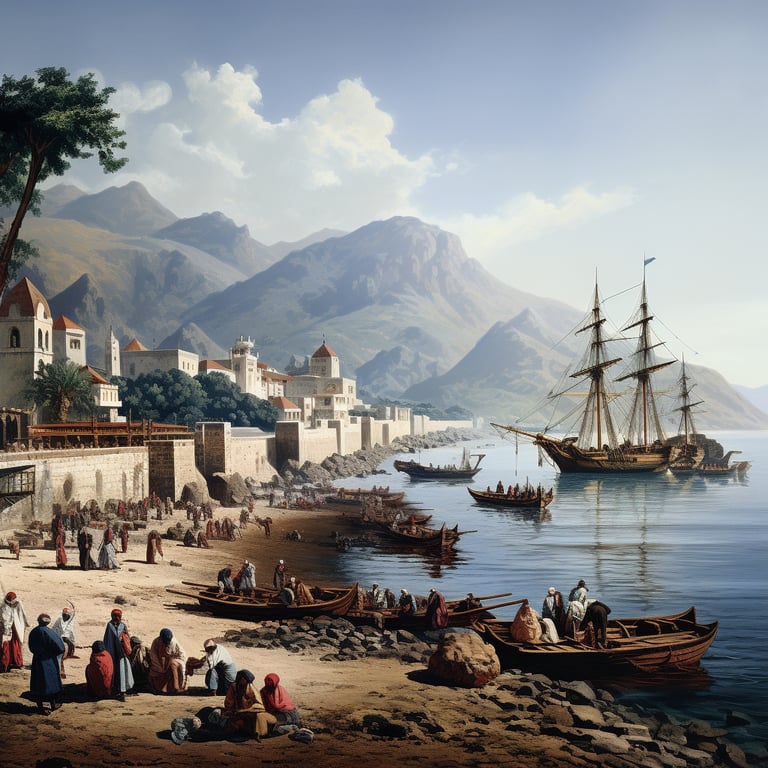The Mamluk Campaign for Aden: A Struggle for Control in the Shadow of Portuguese Expansion
In the early 16th century, the historical saga of Aden was marked by a pivotal chapter - the Mamluk Sultanate's ambitious but ultimately futile attempt to seize this strategic port city. Set against the burgeoning threat of Portuguese naval dominance, this episode underscores a critical period of transition in global maritime power. The Mamluks, ruling over Egypt and the Levant, faced the daunting challenge of extending their land-based military prowess to the naval arena, aiming to counteract the Portuguese incursions that were reshaping the traditional dynamics of the Indian Ocean trade. This effort to capture Aden, a crucial node in the spice trade and a key to controlling the Red Sea, represented not just an economic imperative but a strategic necessity in the face of European expansion. However, fraught with challenges and miscalculations, the Mamluk campaign against Aden stands as a testament to the changing tides of power, signalling the dawn of a new era in maritime geopolitics.
The episode involving the Egyptian Mamluks and their attempt to capture Aden, set against the backdrop of the Portuguese threat, is a fascinating and complex chapter in the history of the region. During the early 16th century, Aden was a critical port city, serving as a major hub in the spice trade and a strategic gateway between the East and the West.
Context of the Mamluk Attempt: The Mamluk Sultanate, based in Cairo, was a powerful Islamic empire that ruled over Egypt and the Levant. The Mamluks, originally slave soldiers, had risen to become rulers in their own right. By the early 1500s, the Portuguese had begun to make significant inroads into the Indian Ocean, threatening the traditional trade routes controlled by the Arabs and the Mamluks. The Portuguese conquests in the Indian Ocean, initiated by Vasco da Gama's journey to India in 1498, marked a significant shift in global trade dynamics.
Strategic Importance of Aden: Aden, located in the south of the Arabian Peninsula, was a crucial link in the chain of the spice trade, especially for goods flowing from India and the East to the Red Sea and then overland to Egypt and the Mediterranean. Control of Aden meant control of a significant portion of the lucrative spice trade. For the Mamluks, securing Aden was not just an economic necessity but also a strategic move to counter the expanding influence of the Portuguese.
The Mamluk Expedition to Aden: In response to the Portuguese threat, the Mamluks decided to take preemptive action. They organized a military expedition to capture Aden and secure the Red Sea trade route. The exact date of this expedition is debated among historians, but it likely occurred in the early 16th century, after the Portuguese had established a presence in the Indian Ocean but before their attempts to seize Aden directly.
Challenges and Failures: The Mamluk attempt to capture Aden, however, was fraught with challenges. Firstly, the Mamluks, predominantly a land-based power, were not as adept at naval warfare as the Portuguese, who had rapidly become a formidable maritime force. Secondly, the geography of Aden, with its rugged terrain and strong fortifications, made it a difficult city to besiege and capture.
Moreover, the local population and authorities in Aden were not necessarily inclined to accept Mamluk rule. The city's strategic importance meant that its loyalty was a prized asset for many regional powers, and the local leaders may have preferred to maintain a degree of autonomy rather than submit to the Mamluks.
Aftermath and Historical Significance: The unsuccessful attempt by the Mamluks to capture Aden underscored the shifting balance of power in the Indian Ocean. It highlighted the challenges that traditional land-based empires faced in adapting to the new maritime-oriented geopolitics. The failure to secure Aden was a significant setback for the Mamluks and illustrated the growing vulnerability of the traditional spice trade routes to European disruption.
This episode, albeit a brief one in the grand tapestry of Aden's history, is emblematic of the larger struggles for control of the Indian Ocean trade during the early modern period. It showcases the complex interplay of regional dynamics, the rise of European naval powers, and the struggle to control key strategic locations like Aden.

